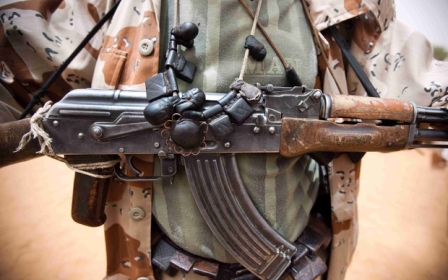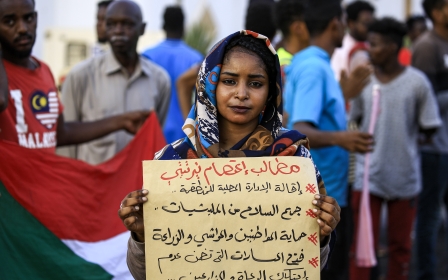Sudan's Bashir goes on trial for 1989 military coup

Sudan’s Omar al-Bashir went on trial on Tuesday over the 1989 military coup which propelled him to power, with the now-deposed president facing the death penalty if found guilty.
The Khartoum courthouse where the trial took place was under heavy police guard with officers armed with AK 47s, rifles, batons and tear gas grenades.
Bashir, who was inside a cage along with the other accused, did not speak during the trial's opening session, which lasted an hour.
"This court will listen to each of them and we will give each of the 28 accused the opportunity to defend themselves," said the presiding judge, Issam al-Din Mohammad Ibrahim.
'This will safeguard Sudanese democracy. In this way, we hope to bring an end to the era of putsches in Sudan'
- Moaz Hadra, lawyer
The judge adjourned the hearings until 11 August and said the courtroom was not large enough to hold the 190 defence lawyers.
Stay informed with MEE's newsletters
Sign up to get the latest alerts, insights and analysis, starting with Turkey Unpacked
While the trial took place, dozens of the defendant's families protested loudly outside the courthouse against the trial.
Bashir rose to power by removing the democratically elected government of Prime Minister Sadiq al-Mahdi. His prosecution will be the first time in modern Arab history that the architect of a coup has been put trial.
The transitional government that replaced Bashir has also promised to hand him over to the International Criminal Court, in order to face war crimes charges over the conflict in Darfur, which he presided over. During that conflict, 300,000 people died and millions were displaced in a scorched earth campaign against a 2003 insurgency.
"This trial will be a warning to anyone who tries to destroy the constitutional system," said Moaz Hadra, one of the lawyers who led the push to bring the case to court.
"This will safeguard Sudanese democracy. In this way, we hope to bring an end to the era of putsches in Sudan."
Historic precedent
Since his removal in April, Bashir has only been seen publicly at court hearings.
He was in the dock again on Tuesday alongside military figures and civilians, including his former vice presidents Ali Osman Taha and Bakri Hassan Saleh, as well as former ministers and governors.
They are all accused of having plotted the 30 June 1989 coup, when the army arrested Sudan's political leaders, suspended parliament and other state bodies, closed the airport and announced the putsch on the radio.
However, the man dubbed the true brain behind the putsch, Hassan Turabi of the National Islamic Front, died in 2016.
Bashir and Saleh "have totally refused to cooperate with the commission of inquiry, but they will be present at the court", Hadra told AFP.
The accused are charged under crimes including Chapter 96 of the 1983 Penal Code, which had been abolished by Bashir, and which carries the death penalty for attempting to destroy the constitutional order.
Sudan has witnessed three military coups since its independence from Britain in 1956, and is now attempting to make the difficult transition to democracy, led by the military-civilian sovereign council and Prime Minister Abdalla Hamdok's transitional government.
As the military and civilian components of the country’s transitional governing bodies clash, however, there has been speculation that another coup could be on the horizon.
Hashem al-Gali, one of 150 defence lawyers, said Bashir and his co-defendants were facing a “political trial” and being held "in a hostile environment on the part of the judicial system against the defendants".
"In fact, this trial is aimed at the Islamic movement and its sole purpose is to present it as a terrorist movement, but we have prepared our defence and we will prove the contrary," Gali told AFP.
He argued that the overthrow of Mahdi took place beyond the statute of limitations and should therefore no longer be dealt with by a court.
Middle East Eye delivers independent and unrivalled coverage and analysis of the Middle East, North Africa and beyond. To learn more about republishing this content and the associated fees, please fill out this form. More about MEE can be found here.





